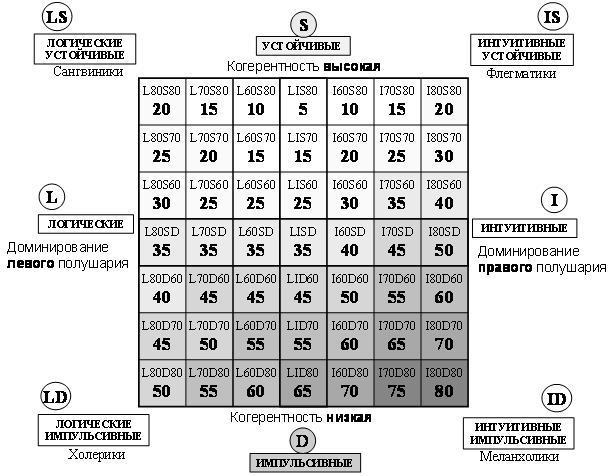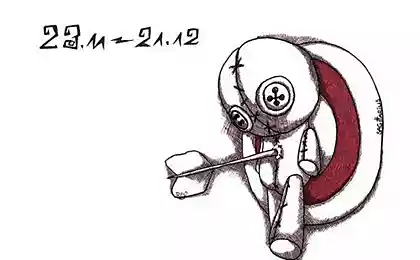520
Learn initially to identify people
Objective psychology: what is the offense
Resentment is the feeling of frustration resulting from unexpected human behavior, of which we do not recognize.
Usually they say: "I did not expect such behavior from him, so I was offended". But why did not expect? Because didn't recognize the man in time. And if you learn to recognize people initially, that resentment will not.

For example, I learned to recognize people initially know how someone will behave in a certain situation. Then this situation came and the man behaved exactly as I expected. Have I offended? Imagine that you came out of the door and walked past the bench, where sits the old lady with the dog. When you have gone dog the hollow. You are offended by a dog? Of course not! Because you expect such a behavior from dogs.
The injustice of the offender
Resentment often associated with injustice. Say: "to me that man was wronged, so I'm pissed at him". Maybe we need to fight injustice, to prevent injustice and, then, resentment can never be.
But justice is a relative concept and everyone understands in their own way. Different psychological types have different understandings of justice.
For example, depressive (melancholic) offense keeps to himself and is convinced that he was wronged. Although the one he offended, doesn't think so. If the depressed person has resentment, then he withdraws into himself and is not doing anything against her abuser. He only wants to restore justice and to deprive the offender of an unfair advantage, which he got offended. But, the desire to deprive another of advantages of is envy. In other words, hurt the melancholic is in a state of envy.
Aggressive people (choleric) also believes injustice attempt to hurt him, get on him. But unlike the melancholic, he is not holding resentment in the heart, and immediately begins to act. More specifically, the hot-headed envy (desire to deprive other benefits) occurs but for a very short time,and then he immediately jumps to the implementation of envy, i.e., begins to take revenge. Revenge is the process of deprivation of other benefits. He begins to restore justice (as he understands it). It may behave aggressively. Aggression is the restoration of justice by force.Any aggressor is convinced that restores justice. Any war starts with the aim of restoring justice. Regardless of whether this war is defensive or offensive.
What to do if you are offended
If there is resentment that inaction leads to envy and depression, and the action – for revenge and aggression.What should I do?
First, try not to fall into unexpected situations, learn to recognize people and to make an adequate forecast of the future. In this case, you do not need and have no one be offended – you all have provided, and fines whether to be offended.
Secondly, if you really are offended, then not to keep a grudge in your heart, and do not act for the sake of justice, and throw the offense out of the heart and change the direction of motion.
The offense has its positive side. Resentment is a sign that you miscalculated in the assessment of situations and people and went in the wrong direction. You have any resentment because I did not expect such a development of events, this behavior. But the situation was clarified and we understand what and who we were wrong. Clarifying the situation is for us a sign that we need to change direction. Now we already have sufficient information in order to get away from misconceptions.
To throw away grudges from the heart
Often asked: how do I throw out the resentment from the heart, if I see her abuser every day; as soon as you see, just remember about the offense, about betrayal.
In such cases it is necessary to apply the principle of isolation. Isolation is physical and emotional. Better to use emotional insulation. The degree of isolation must be equal to the risk of causing you harm. You need to reduce the emotions against the offender. That is, to have his few positive and few negative emotions - to reduce its importance.
Give a figurative example. What emotions do you have when you see the post? Positive or negative? Probably, no! And when you see trash that you cry or rejoice? Probably neither one nor the other. It is also possible not to have emotions towards the person you are unable to recognize initially, and which behaved shamelessly. The conscience is part of the truth presented in the person. If people do not know the truth, where did he take conscience?
You need to understand that this man was impossible to expect anything else. You just didn't recognize it initially, because divorced from reality, concerned about. Projected on him their dreams. But after he showed himself, you have already recognized it. If the offense persists, then you should realize that you are already offended at myself, because I realized that I could not recognize people.
You can't deal with the hurt and dig up the past. Imagine vividly a situation. The man decided to take a short cut through the field. Suddenly he stuck his foot in the manure. One man immediately washed his boots in the puddle, changed direction and went on. In two minutes he forgot about it. Another person in such a situation, studying the shoes within a year. Wow? And on the one hand, and on the other, here green, here brown... And then lives it.
We need to isolate ourselves from the stressful situation by increasing the resistance of mental processes and reducing impulsivity. Stable person does not take offense, because it does not fall in such a situation when you can be offended. He recognizes people and knows how someone will behave in a given situation. He is capable of doing an adequate forecast of the future and develop a realistic strategic plan.
It should be noted that some people unconsciously aspire to the life of the shocks. It would be boring if everything will happen according to a preconceived plan. They are eager for surprises and adventure. They need extreme and adrenaline. And, they have that right. It's a person's choice. The above recommendations for people not suitable.
Forgiveness
It is often said, we must forgive the offender, it is necessary to forgive sins.
Forgiveness of sins is not our business. If the person you offended and violated the principles of life, he will encounter the laws of life, laws of nature. And, he will be punished by life, nature, God. It doesn't matter whether you forgave him or not. Even if you forgive, he will still be faced with the laws of life will suffer.
We are not able to forgive, and to abolish the punishment. We can only help a man to give himself up if he so requests and if we have the skill and desire.
The risk of offense increases when we are worried about something and frantically looking for someone or something in particular. In this case, we project our perception on a certain person, and wishful thinking. We are moving into a world of illusions, and then face reality and take offense.
Don't come in a frenzy. Needs moderation. The one who knows best, was saved in this world.
Sensitivity of different psychological types
Stable psychological types are less prone to injuries. More impulsive. Propolene more offended than left hemisphere.
Below is a table of probabilities of sensitiveness of the various psychological types (in percent).

Thus more than others are offended impulsive intuitive psychological types (melancholic). They offend the logical impulsive personality types (choleric). Themselves choleric touchy too, but they quickly turn to revenge. Stable people are a little offended and a little hurt the others.
EXPLANATION OF THE TERMS USED:
Resentment - there is a sense of frustration arising from unexpected behavior of the person we just do not recognize.
Envy - is the desire to deprive another of benefits.
Revenge - is the process of deprivation of other benefits.
Aggression — is the restoration of justice by force.
The truth is — there is information about the natural world around.
The conscience is a part of the truth presented in the person.
Author: Avtandil Anuashvili
P. S. And remember, just changing your mind — together we change the world! ©
Source: anuashvili.ru/index.php?catid=1:latest-news&id=73:2011-04-02-08-25-43&option=com_content&view=article
Resentment is the feeling of frustration resulting from unexpected human behavior, of which we do not recognize.
Usually they say: "I did not expect such behavior from him, so I was offended". But why did not expect? Because didn't recognize the man in time. And if you learn to recognize people initially, that resentment will not.

For example, I learned to recognize people initially know how someone will behave in a certain situation. Then this situation came and the man behaved exactly as I expected. Have I offended? Imagine that you came out of the door and walked past the bench, where sits the old lady with the dog. When you have gone dog the hollow. You are offended by a dog? Of course not! Because you expect such a behavior from dogs.
The injustice of the offender
Resentment often associated with injustice. Say: "to me that man was wronged, so I'm pissed at him". Maybe we need to fight injustice, to prevent injustice and, then, resentment can never be.
But justice is a relative concept and everyone understands in their own way. Different psychological types have different understandings of justice.
For example, depressive (melancholic) offense keeps to himself and is convinced that he was wronged. Although the one he offended, doesn't think so. If the depressed person has resentment, then he withdraws into himself and is not doing anything against her abuser. He only wants to restore justice and to deprive the offender of an unfair advantage, which he got offended. But, the desire to deprive another of advantages of is envy. In other words, hurt the melancholic is in a state of envy.
Aggressive people (choleric) also believes injustice attempt to hurt him, get on him. But unlike the melancholic, he is not holding resentment in the heart, and immediately begins to act. More specifically, the hot-headed envy (desire to deprive other benefits) occurs but for a very short time,and then he immediately jumps to the implementation of envy, i.e., begins to take revenge. Revenge is the process of deprivation of other benefits. He begins to restore justice (as he understands it). It may behave aggressively. Aggression is the restoration of justice by force.Any aggressor is convinced that restores justice. Any war starts with the aim of restoring justice. Regardless of whether this war is defensive or offensive.
What to do if you are offended
If there is resentment that inaction leads to envy and depression, and the action – for revenge and aggression.What should I do?
First, try not to fall into unexpected situations, learn to recognize people and to make an adequate forecast of the future. In this case, you do not need and have no one be offended – you all have provided, and fines whether to be offended.
Secondly, if you really are offended, then not to keep a grudge in your heart, and do not act for the sake of justice, and throw the offense out of the heart and change the direction of motion.
The offense has its positive side. Resentment is a sign that you miscalculated in the assessment of situations and people and went in the wrong direction. You have any resentment because I did not expect such a development of events, this behavior. But the situation was clarified and we understand what and who we were wrong. Clarifying the situation is for us a sign that we need to change direction. Now we already have sufficient information in order to get away from misconceptions.
To throw away grudges from the heart
Often asked: how do I throw out the resentment from the heart, if I see her abuser every day; as soon as you see, just remember about the offense, about betrayal.
In such cases it is necessary to apply the principle of isolation. Isolation is physical and emotional. Better to use emotional insulation. The degree of isolation must be equal to the risk of causing you harm. You need to reduce the emotions against the offender. That is, to have his few positive and few negative emotions - to reduce its importance.
Give a figurative example. What emotions do you have when you see the post? Positive or negative? Probably, no! And when you see trash that you cry or rejoice? Probably neither one nor the other. It is also possible not to have emotions towards the person you are unable to recognize initially, and which behaved shamelessly. The conscience is part of the truth presented in the person. If people do not know the truth, where did he take conscience?
You need to understand that this man was impossible to expect anything else. You just didn't recognize it initially, because divorced from reality, concerned about. Projected on him their dreams. But after he showed himself, you have already recognized it. If the offense persists, then you should realize that you are already offended at myself, because I realized that I could not recognize people.
You can't deal with the hurt and dig up the past. Imagine vividly a situation. The man decided to take a short cut through the field. Suddenly he stuck his foot in the manure. One man immediately washed his boots in the puddle, changed direction and went on. In two minutes he forgot about it. Another person in such a situation, studying the shoes within a year. Wow? And on the one hand, and on the other, here green, here brown... And then lives it.
We need to isolate ourselves from the stressful situation by increasing the resistance of mental processes and reducing impulsivity. Stable person does not take offense, because it does not fall in such a situation when you can be offended. He recognizes people and knows how someone will behave in a given situation. He is capable of doing an adequate forecast of the future and develop a realistic strategic plan.
It should be noted that some people unconsciously aspire to the life of the shocks. It would be boring if everything will happen according to a preconceived plan. They are eager for surprises and adventure. They need extreme and adrenaline. And, they have that right. It's a person's choice. The above recommendations for people not suitable.
Forgiveness
It is often said, we must forgive the offender, it is necessary to forgive sins.
Forgiveness of sins is not our business. If the person you offended and violated the principles of life, he will encounter the laws of life, laws of nature. And, he will be punished by life, nature, God. It doesn't matter whether you forgave him or not. Even if you forgive, he will still be faced with the laws of life will suffer.
We are not able to forgive, and to abolish the punishment. We can only help a man to give himself up if he so requests and if we have the skill and desire.
The risk of offense increases when we are worried about something and frantically looking for someone or something in particular. In this case, we project our perception on a certain person, and wishful thinking. We are moving into a world of illusions, and then face reality and take offense.
Don't come in a frenzy. Needs moderation. The one who knows best, was saved in this world.
Sensitivity of different psychological types
Stable psychological types are less prone to injuries. More impulsive. Propolene more offended than left hemisphere.
Below is a table of probabilities of sensitiveness of the various psychological types (in percent).

Thus more than others are offended impulsive intuitive psychological types (melancholic). They offend the logical impulsive personality types (choleric). Themselves choleric touchy too, but they quickly turn to revenge. Stable people are a little offended and a little hurt the others.
EXPLANATION OF THE TERMS USED:
Resentment - there is a sense of frustration arising from unexpected behavior of the person we just do not recognize.
Envy - is the desire to deprive another of benefits.
Revenge - is the process of deprivation of other benefits.
Aggression — is the restoration of justice by force.
The truth is — there is information about the natural world around.
The conscience is a part of the truth presented in the person.
Author: Avtandil Anuashvili
P. S. And remember, just changing your mind — together we change the world! ©
Source: anuashvili.ru/index.php?catid=1:latest-news&id=73:2011-04-02-08-25-43&option=com_content&view=article
Ford introduced the drone delivery van for delivery of goods
Disappointment: see partner without their fantasies























